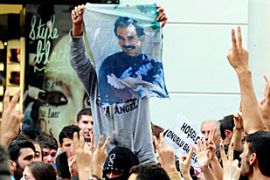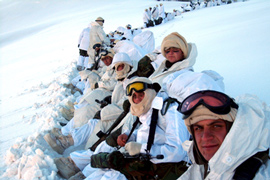PKK fighters in ‘peace’ initiative
Group crosses border from Iraq to show support for Ankara’s plans to end conflict.

“I hope this opportunity will not be missed,” he told Turkish state television. “It’s not possible to struggle against an enormous state, the Turkish state, and to live in the mountains for a lifetime,” he said.
All of the group were taken in for questioning as four prosecutors sent to meet the party determined whether those held had committed any crimes.
‘Cultural rights’
The PKK have claimed that Turkish nationalists and other opposition parties are blocking the initiative, and say they hope to encourage the government to continue the process.
The group had brought with them a list of demands to hand over to Turkish authorities, the pro-Kurdish Firat news agency.
These included an end to Turkish military operations against the PKK and negotiations for a solution to the conflict.
There were also requests for a constitutional recognition of the Kurdish identity and greater language and cultural rights for the country’s 12 million-strong Kurdish community.
More than 40 lawyers travelled to Habur to assist the group during the interrogation at military barracks inside the border area, one of the legal advisors told the state-run Anatolia news agency.
Turkish officials have said the group’s members were welcome if they were in Turkey to turn themselves in, but Murat Karayilan, a senior PKK commander, told Firat on Sunday that the group’s aim was not surrender.
Natonwide rallies
Rallies in support of the group were held in several cities across the country with about 5,000 people gathered in a central square in Diyarbakir, the biggest city in the mainly Kurdish southeast, following a call by the Kurdish Democratic Society Party.
“Welcome peace ambassadors! Hand in hand for an honourable peace,” chanted the protestors, along with slogans in favour of Ocalan.
Similar demonstrations took place in Batman and Mardin in the southeast and the eastern cities of Tunceli, Van and Mus.
There also gatherings in Izmir in the west and the country’s biggest city Istanbul, both of which have sizeable Kurdish communities.
A large crowd, around 2,500 people, according to police, marched down Istiklal Avenue, the main commercial street in Istanbul’s European quarter, behind a banner which read “Open the Way for Peace”.
Economic help
“We hope this will be the beginning of solving the Kurdish case through dialogue and away from the gun barrels,” Bozan Taken, a PKK leader, told the AP news agency by telephone.
 |
|
Parliament this month extended the mandate of the army to strike PKK bases Iraq [EPA] |
“We want to show the world that we are with peace and we want peace.
“The Turkish side has to do the same and to find a radical solution to the Kurdish case.”
The government in recent years has provided more economic help and some expanded cultural rights to Kurds, including lifting a ban on the Kurdish language in 1991.
At the same time, it has accelerated its military campaign, staging a ground offensive last year against suspected PKK targets in northern Iraq, and launching cross-border aerial attacks with the help of intelligence from the United States.
Parliament this month extended the military’s mandate to strike the fighters’ bases in Iraq.
The PKK had sent two groups of fighters in 1999 on a similar peace initiative, but they were arrested and then jailed for belonging to the organisation.
The conflict with the PKK, who want autonomy in southeast Turkey, has left more than 45,000 people dead.